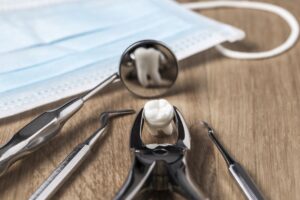 A dental implant is the most advanced method of treating tooth loss. It is the only treatment to mimic both the tooth root and the crown, providing results that look and feel natural. Although dental implants are the most successful solution for treating missing teeth, your real teeth are still the best. Your dentist will always strive to preserve your natural teeth, but there are some situations when extractions may be best. Here’s when your dentist may recommend removing healthy teeth and replacing them with dental implants.
A dental implant is the most advanced method of treating tooth loss. It is the only treatment to mimic both the tooth root and the crown, providing results that look and feel natural. Although dental implants are the most successful solution for treating missing teeth, your real teeth are still the best. Your dentist will always strive to preserve your natural teeth, but there are some situations when extractions may be best. Here’s when your dentist may recommend removing healthy teeth and replacing them with dental implants.
Tooth Preservation is Important
Your teeth are important for more than a beautiful smile. They are necessary for your oral health and functions. Losing a single tooth can cause your jawbone to shrink because it’s no longer being stimulated by the root. Although a dental implant offers jaw bone preservation, there’s nothing quite like your real teeth.
Sometimes Extractions are Best
In most situations, dentists recommend saving every healthy tooth, but there are instances when extractions are beneficial. If you’ve experienced significant tooth loss in one or both arches and only have a couple of healthy teeth left, removing them will allow you to benefit from implant dentures. Healthy teeth may also be removed for underlying issues, like infections or bone loss. Removing teeth isn’t a decision your dentist makes lightly. They will explain all your options and the benefits of each.
How Dental Implants Work
If extractions are in your best interest, your dentist may recommend dental implants to fill the space of your lost teeth. Titanium posts are surgically placed into your jaw to serve as new tooth roots. Your jaw will fuse to them through a process called osseointegration, providing unmatched support and stability for your customized restoration. You’ll regain up to 70% of your biting force using a solution with over a 95% success rate. Your new teeth can last for 30 years or longer with the right aftercare, like brushing and flossing.
Choosing to extract teeth for dental implants is a big decision. Don’t hesitate to get a second opinion before moving forward. Your dentist will explain the pros and cons, so you can make an educated decision for your oral health and quality of life.
About Dr. Michael Young
Dr. Young achieved his dental degree from the University of Michigan School of Dentistry and has continued his education in advanced services, like oral surgery. Bone grafting, and dental implants. He is a respected member of the dentistry community and is affiliated with several professional organizations, including the International College of Dentistry, the American Dental Association, and the Michigan Dental Association. Request an appointment through his website or call his office at (586) 217-3003.

